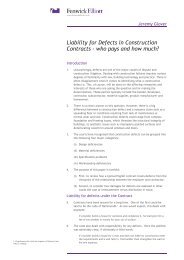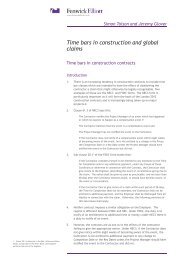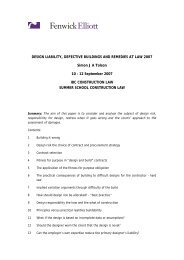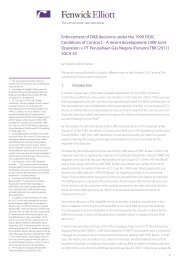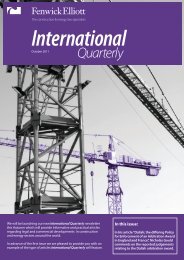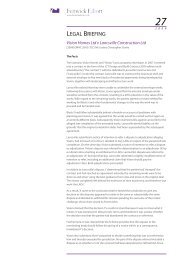Insight: RomaniaInternational focus on countries and sectors Issue 01, 2011Arbitration (Sub-Clause 20.6) – Animportant, although not obvious, changeas been introduced by the new conditionsof contract in relation to the arbitrationclause. Although Sub-Clause 20.6 has notbeen amended per se, Sub-Clause 1.4has been amended to the effect that thelanguage for communications under theContract is now Romanian. In practice,this means that by virtue of paragraph(c) of Sub-Clause 20.6, the language tobe used in any arbitration proceedingsis also Romanian unless this paragraph isamended.delay damages that have been paid shallbe reimbursed.Payments under the Contract shall notexceed 110% of the Accepted ContractAmount – regardless of the causes leadingto the additional costs (except in the eventof a price adjustments resulting from Sub-Clauses 13.7 [Changes in Legislation] and13.8 [Changes in Costs]).Delayed payment - The Contractor isdeemed to have waived its right to intereston late payment if no invoice is issuedwithin two months and the Employer is alsogiven an additional 45 days (in addition tothe 56 days from the Engineer’s certificate)before having to pay the Contractor.The Contractor’s right to suspend workhas been significantly restricted (Sub-Clause 16.1) – This can only be done after183 days from the Employer’s notificationas opposed to 21 days.Termination by Employer (Sub-Clause15.2) and by Contractor (Sub-Clause16.2) – Conscious that the exceptionallyhigh number of termination cases clearlyaffected the completion of major roadprojects in Romania, a solution wasfound by the Ministry of Transport withthe following amendment to Sub-Clause16.2: termination will only take effectafter having obtained a final and bindingDAB (which is unlikely to happen as theEmployer will undoubtedly issue a noticeof dissatisfaction) or an arbitral awardconfirming the Contractor’s entitlementto terminate and the effectiveness ofsuch termination. This means that theContractor is completely deprived inpractice from its right to terminate theContract as the Contractor will be requiredin the meantime, under the new conditionsof contract, to comply with its obligationsunder the Contract irrespective of its noticeof termination and the Employer’s failures.The above changes introduced by thenew FIDIC conditions of contract haveso drastically modified the original FIDICconditions of contract that one can nolonger describe them as either fair orbalanced. The pressure exercised recentlyby European contractors and organizationsrepresenting them for a rapid change inlegislation is a welcome move. Until thena number of experienced contractors nowrefrain from tendering for road projectsin Romania. This is obviously not in theinterest of Romania and certainly not of theEU which is financing a very large portionof these projects.Frederic Gillion, Partner<strong>Fenwick</strong> <strong>Elliott</strong>+44 (0)207 421 1986fgillion@fenwickelliott.com
News and EventsTrends, topics and breaking news from <strong>Fenwick</strong> <strong>Elliott</strong> Issue 01, 2011International Quarterly first editionWe hope that you have found thisfirst edition of International Quarterlyboth informative and useful. We aimto keep you updated regarding legaland commercial developments inconstruction and energy sectors aroundthe world. <strong>Fenwick</strong> <strong>Elliott</strong>’s team ofspecialist lawyers have advised onnumerous major construction and energyprojects worldwide, nurturing schemesto completion with a combination ofcareful planning, project support and riskassessment. From document preparationto dispute resolution, our services spanevery stage of the development process.We also offer bespoke training to ourclients on various legal topics affectingtheir business – for example, earlier thisyear we hosted a very successful halfday seminar and workshop in Bucharest,on the use of the FIDIC Yellow Book forinfrastructure projects in Romania. If youare interested in receiving bespoke inhousetraining please contact Susan Kirbyskirby@fenwickelliott.com for a list of topics.Our international workOur firm continues to secure instructionson projects outside the UK. In recentmonths we have received instructionsrelating to power and desalination plantsin the Middle East and road projects and aland fill site in Eastern Europe.Launch of new <strong>Fenwick</strong> <strong>Elliott</strong> websiteWe are delighted to announce that wehave launched our new websitewww.fenwickelliott.com . The new lookwebsite provides examples of our workand features a comprehensive “Researchand insight” section hosting articlesand papers written by <strong>Fenwick</strong> <strong>Elliott</strong>colleagues on various construction andenergy law topics.Annual Review 2011/2012Our annual publication which containsa round up of the key developments inthe construction, engineering and energyarena is now available to <strong>download</strong> fromour website . If you would like to receivea hard copy of this Review please contactSusan Kirby skirby@fenwickelliott.comAbout the editor, Jeremy GloverJeremy has specialised in constructionenergy and engineering law and relatedmatters for most of his career. He adviseson all aspects of projects both in the UKand abroad, from initial procurementto where necessary dispute avoidanceand resolution. Typical issues dealt withinclude EU public procurement rules,contract formation, defects, certificationand payment issues, disruption, loss and/or expense, prolongation, determinationor repudiation and insolvency.He has advised clients in internationalarbitrations under ICC, UNCITRAL and adhoc rules as well as in relation to all sizesof domestic disputes. He is an accreditedadjudicator and regularly advises on boththe conduct of adjudication and theenforcement of adjudicator’s decisions.Jeremy is also increasingly involved in thedispute resolution opportunities offeredby mediation, expert determination andother forms of ADR.Jeremy is the co-author of UnderstandingThe New FIDIC Red Book: A Clause byClause Commentary. He also works withRobert <strong>Fenwick</strong> <strong>Elliott</strong> preparing annualupdates of Building Contract Disputes:Practice and Precedents. Jeremy is amember of the Board of Examiners onthe Centre of Construction Law MScprogramme at King’s College, Londonwhere he also teaches on adjudicationand FIDIC issues. Jeremy organises andregularly addresses <strong>Fenwick</strong> <strong>Elliott</strong> hostedseminars and provides bespoke in-housetraining to clients. He also edits <strong>Fenwick</strong><strong>Elliott</strong>’s monthly legal bulletin, Dispatch.International Quartely is producedquartely by <strong>Fenwick</strong> <strong>Elliott</strong> LLP, theleading specialist construction lawfirm in the UK, working with clientsin the building, engineering andenergy sectors throughout theworld.International Quartely is anewsletter and does not providelegal advice.Edited by Jeremy Glover, Partner, <strong>Fenwick</strong> <strong>Elliott</strong> LLPjglover@fenwickelliott.com Tel: + 44 (0) 207 421 1986<strong>Fenwick</strong> <strong>Elliott</strong> LLPAldwych House71-91 AldwychLondon , WC2B 4HNwww.fenwickelliott.com



